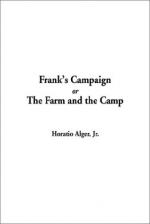It may be remarked that Squire Haynes, the speaker, was the wealthiest man in town, and, of course, would be considerably affected by increased taxation. Even now he never paid his annual tax-bill without an inward groan, feeling that it was so much deducted from the sum total of his property.
Mr. Frost remained standing while Squire Haynes was speaking, and at the close continued his speech:
“Squire Haynes objects that my proposition, if adopted, will make our taxes heavier. I grant it: but how can we expect to carry on this gigantic war without personal sacrifices? If they only come in the form of money, we may account ourselves fortunate. I take it for granted that there is not a man here present who does not approve the present war—who does not feel that we are waging it for good and sufficient reasons.”
Here Mr. Holman moved uneasily in his seat, and seemed on the point of interrupting the speaker, but for some reason forbore.
“Such being the case, we cannot but feel that the burden ought to fall upon the entire community, and not wholly upon any particular portion. The heaviest sacrifices must undoubtedly be made by those who leave their homes and peril life and limb on the battlefield. When I propose that you should lighten that sacrifice so far as it lies in your power, by voting them a bounty, it is because I consider that money will compensate them for the privations they must encounter and the perils they will incur. For that, they must look to the satisfaction that will arise from the feeling that they have responded to their country’s call, and done something to save from ruin the institutions which our fathers transmitted as a sacred trust to their descendants. Money cannot pay for loss of life or limb. But some of them leave families behind. It is not right that these families should suffer because the fathers have devoted themselves to the sacred cause of liberty. When our soldiers go forth, enable them to feel that their wives and children shall not lack for the necessaries of life. The least that those who are privileged to stay at home can do is to tax their purses for this end.”
“Mr. Chairman,” said Squire Haynes sarcastically, “I infer that the last speaker is intending to enlist.”
Mr. Frost’s face flushed at this insinuation.
“Squire Haynes chooses to impute to me interested motives. I need enter into no defense before an audience to whom I am well known. I will only inquire whether interested motives have nothing to do with his opposition to voting bounties to our soldiers?”
This was such a palpable hit that Squire Haynes winced under it, and his red face turned redder as he saw the smiles of those about him.
“Impudent puppy!” he muttered to himself; “he seems to forget that I have a mortgage of eight hundred dollars on his farm. When the time comes to foreclose it, I will show him no mercy. I’ll sell him out, root and branch!”




